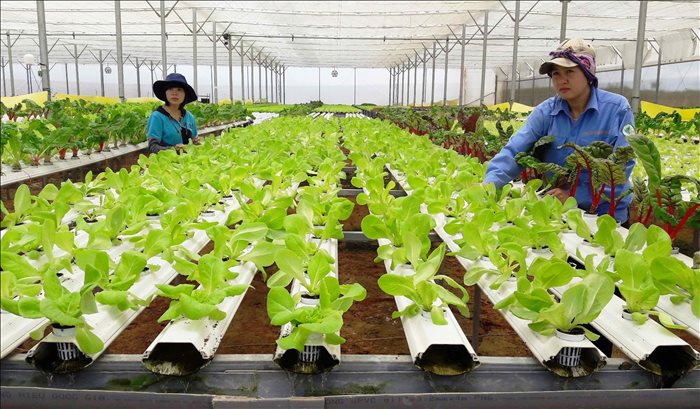- Giới thiệu
- Nhóm Công tác
- Tin tức
- Thông tin về FTA
- Tài Liệu
- Sự kiện
- Liên hệ
Approving a Scheme for Organic Agriculture Development in Viet Nam
Developing high-value, sustainable and eco-friendly organic agriculture in association with the circular agricultural economy to serve domestic consumption and export. Organic agricultural products certified with regional and international organic agricultural standards; turning Viet Nam into a country with organic agriculture production capability equal to developed countries in the world.

Deputy Prime Minister Trinh Dinh Dung has just signed a decision approving a Program for Organic Agriculture Development in Viet Nam for the period 2020-2030.
Specifically, by 2025, the area of organic farming land will reach about 1.5-2% of the total agricultural land. The area of organic farming land will account for over 1% of the total cultivated land of major crops such as rice, vegetables, fruits, tea, pepper, coffee, cashew, coconut, etc.
The percentage of organic livestock products will account for about 1-2% of the total domestic livestock products. Priority shall be given to obtaining organic certification of livestock products with potential strengths such as milk, honey products, bird's nest products, cattle and poultry meat.
The area of organic aquaculture will account for about 0.5 - 1.5% of the total aquaculture area, including specialty aquatic species with high economic value such as: brackish water shrimp, giant freshwater shrimp, indigenous aquatic species, etc.
Regarding efficiency of organic production per unit area, the product value per 1 hectare of organic cultivation and aquaculture land is targeted to reach 1.3-1.5 times higher than non-organic production.
The primary tasks set out to achieve the above objectives are to develop concentrated organic agricultural production zones and key organic products; diversify production organization forms of organic products; research, development and application of technology in organic agriculture; develop certification organizations, improve the system of standards, regulations and technical processes; increase processing, consumption and export of organic products.
The Ministry of Agriculture and Rural Development will assume the prime responsibility and coordinate with Ministries, branches and localities in implementing the Program; actively integrate the objectives and tasks of the Program with national target programs and projects of other related ministries, branches and localities; select and identify the factors to improve pilot models of organic agriculture in localities according to the approved list; designate units with capacity and experience in conducting research, certification and value chain linkages to participate in the implementation of pilot models, develop implementation plans and gradually expand the models; organize the inspection, supervision, evaluation and annually report to the Prime Minister on the implementation of the Program.
The People's Committees of provinces and cities directly under the Central Government shall identify advantageous products, key fields and areas with advantages in organic production, and coordinate with the Ministry of Agriculture and Rural Development in formulating programs and projects to develop organic agriculture to meet requirements and in accordance with industry standards. Provincial People’s Committee are tasked to build specific local mechanisms and policies such as land, infrastructure, seeds, organic production technology ... to serve the development of organic agriculture.
Besides, local governments are requested to allocate funds from local budgets and mobilize official capital to implement organic agricultural development projects in the area; regularly organize the inspection of the implementation of local organic agricultural development projects, annually synthesize reports on the implementation of local projects and send them to the Ministry of Agriculture and Rural Development for synthesis and reporting to the Government.
Source: VGP
Tin liên quan
PSAV Attends the 30th Anniversary Celebration of Cargill Vietnam2025/10/23
Plant health management helps increase coffee yield up to 15%2025/10/16
An Giang to host 2025 OCOP forum for sustainable development2025/09/25
Viet Nam and France foster cooperation on blue economy and sustainable environment2025/09/29
Agriculture and Environment exhibition ready for National celebration2025/08/27



 Điều lệ hoạt động
Điều lệ hoạt động



















































